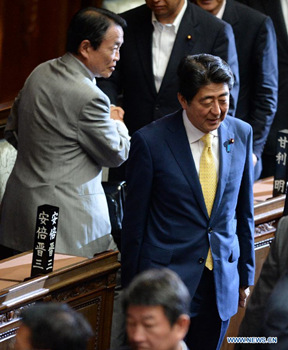
Japanese Prime Minister Shinzo Abe (R) thanks for passing the controversial security bills at the lower house of the nation's Diet in Tokyo, Japan, on July 16, 2015. (Photo: Xinhua/Ma Ping)
Overseas experts and scholars have voiced concern over Japan's new security bills which were bulldozed by Prime Minister Shinzo Abe through the lower house of parliament on Thursday, saying the move will put Japan on a path toward militarization.
French newspaper Le Monde reported that Abe would find it very difficult to convince a public which has begun to turn against the new security bills.
About 25,000 protesters assembled in Tokyo to show their anger toward the rightist government's dangerous attempt to amend the country's defense policy.
Joseph Matthews, a scholar on international relations at Asia Europe University of Cambodia, noted that Japan's new security bills will have a profound and dangerous impact in Asia.
They will create a sense of insecurity, fear and distrust in Asian countries, especially those in the Association of Southeast Asian Nations, Matthews said, adding that overseas military deployment by Japan may lead to a dangerous arms race in Japan's neighbors, such as South Korea and the Democratic People's Republic of Korea.
It would jeopardize the multilateral efforts to promote the denuclearization of the Korean peninsular, Matthews said, noting that such bills are in violation of Japan's pacifist constitution.
Abe's government has now been controlled by the radical rightist groups in the ruling party, Matthews said, adding that Japanese radical nationalists now believe that China's rise is the first threat to their country, which is only an unfounded idea invented by warmongers.
Chheang Vannarith, a senior fellow at the Cambodian Institute for Cooperation and Peace, said that the acts of Abe government will deepen the strategic distrust between Japan and China or other Asian countries.
Citing an official from the South Korean Foreign Ministry, South Korea's Newsies News Agency said that South Korea maintains its consistent position on Japanese defense policy, which is that Japan should abide by its pacifist constitution.
South Korea's Aju Business Daily said the move of Abe's government has revealed some Japanese politicians' ambition to reconstruct Japan as a country that can start wars.
Turning Japan from a defensive country to an offensive one will exacerbate the tense situation in Northeast Asia, said the daily.
Ted Carpenter, a senior fellow for defense and foreign policy studies at the Cato Institute, said Wednesday that Japan's ongoing boost of military power will increase instability throughout East Asia if it can not provide credible reassurance to its neighboring countries.
"Japan has been moving in stages toward a more assertive military posture for years, and the new security bills are just the latest phase," Carpenter told Xinhua.
"It is clear that Tokyo is becoming a more active player in the security arena. As it does so, it is imperative for Prime Minister Abe and other officials to reassure Japan's neighbors by actions as well as words, that there is no intention of reviving Japan's militaristic, imperial past," Carpenter said.
















































